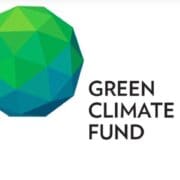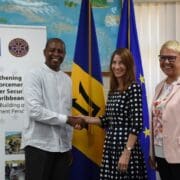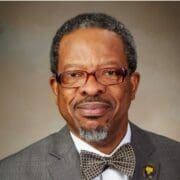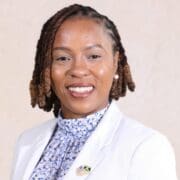Black Immigrant Daily News
Ivelaw Lloyd Griffith, a former Vice Chancellor of the University of Guyana, is a Senior Associate at the Center for Strategic and International Studies in Washington, DC.
By Ivelaw Lloyd Griffith
This is the second article of a two-part series on the ongoing territorial-judicial saga between Guyana and Venezuela. The first one examined some recent developments in Guyana’s oil exploration and production landscape, which have increased the stakes for the two oil-rich nations. In this concluding article we examine the security investment imperative the government has been pursuing while it awaits the ruling of the World Court.
Moutar and Guitar
Budgetary and other recent actions by the Guyana government suggests that investing in security assets isn’t just attracting platitudes, but tangible action. To use Guyanese parlance, the authorities aren’t just “playing moutar, but also guitar.” Put differently, they are putting their money where their mouth is. For one, budget allocations for this year adopted by the National Assembly for the security services suggest that the government takes the investment in security assets imperative seriously, conscious that the security sector agencies have serious deficits in personnel, equipment, and training.
The budget itself–G$781.9 billion (US$3.7 billion)–is the largest ever in the country’s history. It represents a 41 percent increase over the outlay for 2022, with almost 30 percent drawing on oil revenues, to the tune of G$208.9 billion (US$ 992 million). Moreover, for the first time ever, use has been made of funds from the sale of carbon credits, in the amount of G$31.3 billion (US$149 million). The carbon credits deal was made last year with the Hess Corporation and provides for a minimum of US$750 million to the Cooperative Republic between 2022 and 2032. The initial US$75 payment was made in January 2023 and two additional payments are expected later this year.
The allocation for the army increased from G$17,631,014,000 (US$83,165,493) in 2022 to G$20,228,261,000 (US$95,416,707) for this year. The Guyana Defense Force (GDF) identified some pretty aggressive goals for 2023, including increasing the number of foreign threats averted from two in 2022 to 20 this year, growing the number of officers trained by 100 percent, from 40 last year to 80 this year, and expanding joint exercises from 12 in 2022 to 20 this year.
As for the police and other internal security agencies, the funding grew from G$51.5 billion (US$242,925,500) expended in 2022 to an allocation of G$58.6 billion (US$276,416,200) for this year. This included G$2.4 billion (US$11,320,800) to upgrade police stations and facilities, money to increase force mobility, and G$2 billion (US$9,434,000) to expand the safe city program in two of the country’s ten administrative regions, key to which is the provision of Intelligence Video Surveillance Command Centers and 911 emergency response capability in those regions.
Security Partnerships
The government is taking a holistic approach to basic security, prioritizing both hard assets to assist with a broad range of missions and strategic diplomatic partnerships. The growing security relationship with India, for instance is part of a broader strategic partnership between the two countries, in the areas of oil and gas, food security, and technology. One hopes that the diversification of security relationships soon would be extended to Brazil, with which Guyana once had a strong relationship and remains a key actor in the geopolitical relationship involving Venezuela, as well as a valued ally in the proposed tripartite energy security partnership that would include Suriname.
The security partnership with the United States continues to be strengthened, notably is the three-day visits by SOUTHCOM Commander Admiral Craig Faller in January 2021 and last August by his successor, General Laura Richardson, to meet with political, military, and civic leaders about enhancing security ties between the two nations. Guyana also hosted the SOUTHCOM-sponsored Tradewinds 2021, a training exercise with ground, air, sea, and cyber aspects that brings together forces from the United States and Caribbean and other nations.
Noteworthy, too, Guyana has joined the Barbados-based Regional Security System (RSS). In March 2022 President Ali signed the RSS protocol while in Belize for a meeting of CARICOM leaders, and the following September Guyana formally became the eighth member when President Ali signed the instrument acceding to the RSS Treaty, joining Antigua and Barbuda, Barbados, Dominica, Grenada, St. Kitts and Nevis, St. Lucia, and St. Vincent and the Grenadines in the alliance that dates to 1982, becoming the member with the largest army. Incidentally, both the GDF and the Guyana Police Force (GPF) will participate in the RSS, as is the case with the other RSS members that have both defense and police forces.
For all the commendable investment in assets and strengthening of strategic partnerships, a cautionary note is warranted. Guyana faces both traditional and non-traditional security threats, notably territorial claims by both Venezuela and Suriname in the traditional area, and narco-trafficking, crime and violence, illegal migration, and human trafficking in the non-traditional one. Thus, even with the recent and planned investments the country’s security establishment, it will still face serious capability limitations in terms of personnel, equipment, and training.
However, there may be a risk that leaders in Guyana either are under-appreciating the scope of the threats, over-estimating the extent to which the new assets will address the security deficits, or both. A danger in the offing makes this conclusion plausible. The danger is what military professionals call mission creep: the gradual or incremental expansion of an organization’s mission beyond its original focus or goals, which risks compromising its overall efficiency and operational success because of the lack of commensurate resources to accomplish the expanded mission.
Recent pronouncements at the army’s 2023 officers conference, held on February 9 last, portend such a danger. The Commander-in-Chief contended that in addition to meeting the nation’s security challenges the GDF should rise to the challenge and consider how it will address issues such as the food and energy crises not only in Guyana but in the region. He also touted the idea that the Air Corps could expand its mandate and conduct forest monitoring activities, arguing that “the monitoring of our forest is part of our defense challenge, because it is an important national asset, earning revenue.”
Moreover, the president advocated a role for the GDF in the development of emergency mapping services, noting “In every region, I am tired with the fire tender turning up and they don’t know where the drain is, they don’t know where the trenches are… Is there a cluster map? How do we develop a cluster map for every region, and then a cluster map for different communities?”
In sum, as the waiting game plays itself out, Guyana is making prudent and pragmatic investments in security assets. Nonetheless, the leaders there might do well to guard against mission creep, lest they compromise the ability of the army to deliver effectively on its core mission and undermine the confidence of citizens in both them and it.
______
Ivelaw Lloyd Griffith, a former Vice Chancellor of the University of Guyana, is a Fellow with the Caribbean Policy Consortium and Global Americans. His next book, Challenged Sovereignty: The Impact of Drugs, Crime, Terrorism, and Cyber Threats in the Caribbean, will be published by the University of Illinois Press.
Donate At Caribbean News Service, we do not charge for our content and we want to keep it that way. We are seeking support from individuals and organisations so we can continue our work & develop CNS further.
NewsAmericasNow.com











